Rabbits
How Rabbits Can Safely Eat Mustard Greens: A Guide
Learn how rabbits can enjoy the benefits of mustard greens safely and discover the key to a balanced diet for your furry friend.
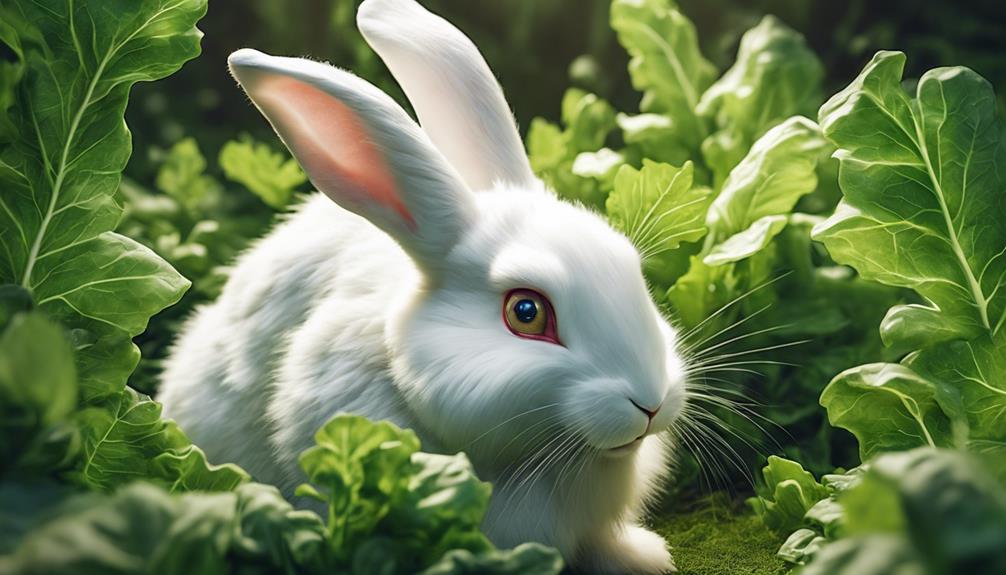
When feeding mustard greens to our rabbits, it is important to thoroughly wash them, chop them into small pieces, and offer a variety of safe vegetables. These greens are rich in vitamins and nutrients that promote good health and digestion. Remember to introduce them slowly into your rabbit’s diet to ensure they adjust well. Starting with small amounts and keeping an eye out for any adverse reactions is essential.
Guarantee proper preparation and portion control for your furry friend's safety. Get ready to explore more ways to keep your rabbit happy and healthy with mustard greens!
Key Takeaways
- Gradually introduce mustard greens to prevent digestive issues.
- Monitor for adverse reactions when incorporating into the diet.
- Consult a vet for rabbits with dietary restrictions or health concerns.
- Rotate mustard greens with other leafy greens for a balanced diet.
- Ensure proper portion control to avoid overfeeding and digestive problems.
Nutritional Benefits of Mustard Greens for Rabbits
Mustard greens offer a plethora of essential nutrients that are important for the overall health and well-being of rabbits. These Leafy Greens and Vegetables are packed with vitamins A, C, and K, along with fiber, calcium, and potassium, making them a fantastic addition to your rabbit's diet.
Rabbits benefit greatly from the nutritional advantages of mustard greens. The vitamins present in these greens promote strong eyesight, a healthy immune system, and proper blood clotting. Additionally, the fiber content aids in digestion, preventing gastrointestinal issues and ensuring smooth digestion for your furry companion.
Mustard greens are also low in calories, supporting weight management for rabbits while keeping them hydrated due to their high water content. By incorporating these nutrient-rich greens into your rabbit's meals, you're providing a balanced and nutritious diet that contributes to their overall well-being and vitality.
Preparing Mustard Greens for Your Bunny
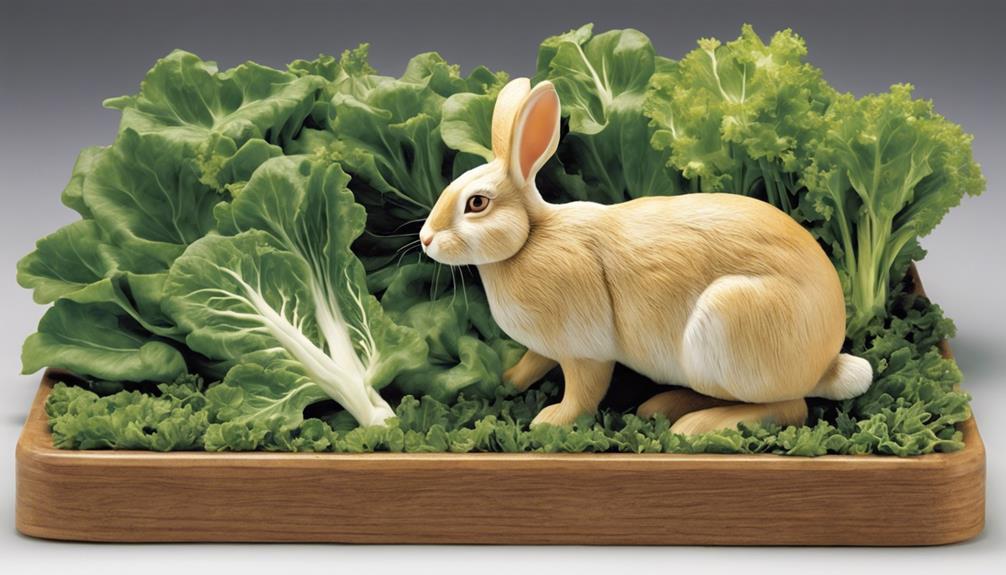
When preparing mustard greens for your bunny, ensuring thorough washing to remove any dirt and pesticides is essential for their health and well-being. Mustard greens are a nutritious addition to your rabbit's diet, but proper preparation is crucial to keeping them safe. Here are some essential steps to prepare mustard greens for your beloved small pet:
- Wash Thoroughly: Rinse the mustard greens under running water to eliminate any dirt, chemicals, or pesticides that may be present on the leaves.
- Remove Wilted Leaves: Discard any wilted or damaged leaves before serving the mustard greens to your bunny.
- Cut Into Bite-sized Pieces: Chop or tear the mustard greens into small, manageable pieces to make it easier for your rabbit to eat and digest.
- Offer Variety: Include mustard greens as part of a balanced diet that includes other safe vegetables and leafy greens to offer a diverse range of nutrients to your bunny.
Incorporating Mustard Greens Into Rabbit's Diet
Incorporating mustard greens into your rabbit's diet can provide vital nutrients for their overall health and well-being when introduced gradually alongside their regular food choices. Mustard greens, rich in vitamins and minerals, can be mixed with other leafy greens to offer a balanced nutrient intake for your rabbit. However, it's important to feed the mustard green stems in moderation as they can lead to gastrointestinal distress if consumed excessively.
When introducing mustard greens to your rabbit, it's best to do so slowly and in small amounts. This allows you to monitor how your rabbit's digestive system responds to this new addition to their diet. Opting for fresh, organic mustard greens is advisable to minimize exposure to pesticides, ensuring the health and safety of your furry companion.
Remember that mustard greens are high in oxalates, so it's crucial to limit their consumption to prevent the formation of bladder stones in rabbits. By incorporating mustard greens thoughtfully and responsibly into your rabbit's diet, you can promote their overall well-being and nutrition.
Potential Risks of Mustard Greens for Rabbits

Careful consideration must be given to the potential risks associated with incorporating mustard greens into a rabbit's diet. Mustard greens contain oxalates, which can lead to calcium deposits in rabbits, impacting their urinary health.
Overfeeding mustard greens can result in gastrointestinal problems such as diarrhea or bloating, affecting the delicate balance of a rabbit's digestive system. Some rabbits may have allergies to mustard greens, causing adverse reactions like itching, swelling, or even difficulty breathing, emphasizing the importance of introducing new foods gradually.
Proper portion control is vital to prevent nutritional imbalances and guarantee that the rabbit's diet remains diverse and balanced. By monitoring the amount of mustard greens given to rabbits and incorporating them alongside other safe vegetables, one can help mitigate the potential risks associated with their consumption. Always wash mustard greens thoroughly before feeding to remove any pesticides or contaminants, prioritizing the well-being of the rabbit.
- Mustard greens contain oxalates, which can lead to calcium deposits.
- Overfeeding can cause gastrointestinal problems.
- Some rabbits may be allergic to mustard greens.
- Proper portion control is vital for a balanced diet.
Ensuring Safe Consumption of Mustard Greens
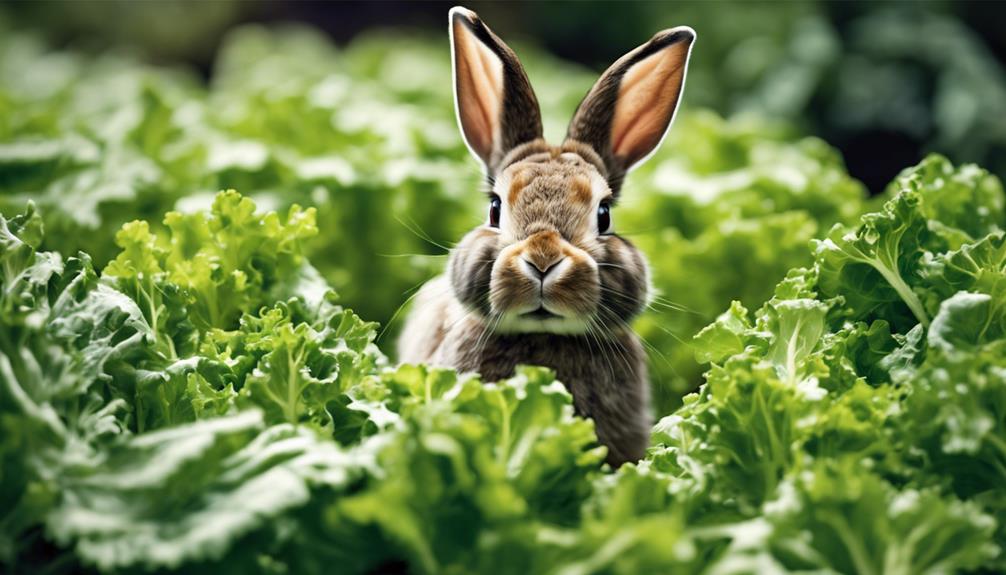
To guarantee the safe consumption of mustard greens by rabbits, gradual introduction of this dark leafy green into their diet is essential to monitor for any potential adverse reactions.
Mustard greens, like other dark leafy greens, are rich in nutrients but can cause digestive issues if not introduced slowly. Rabbits, known for their sensitive stomachs, may react adversely to sudden dietary changes, so it's important to feed mustard greens in moderation.
If your rabbit has a sensitive stomach or specific dietary restrictions, consulting a vet before adding mustard greens is recommended. Due to the presence of oxalic acid in mustard greens, monitoring your rabbit's health closely is crucial.
To ensure a balanced diet, rotate mustard greens with other leafy greens to provide a variety of nutrients. By following these steps and being attentive to your rabbit's well-being, you can safely incorporate mustard greens into their diet for optimal health and nutrition.
Frequently Asked Questions
Can You Feed a Rabbit Mustard Greens?
Yes, we can feed rabbits mustard greens, but it's essential to introduce them slowly and watch for any digestive issues. Opt for fresh, organic greens to minimize pesticide exposure. Limiting high-oxalate foods like mustard greens is important to prevent bladder stones.
How Do You Feed Rabbits Greens?
We introduce fresh greens like mustard greens gradually to rabbits, monitoring for adverse reactions. Washing all greens thoroughly before feeding guarantees they're clean. Rotation of various greens offers a balanced diet, keeping our fluffy friends healthy and happy.
How Much Is Too Much Greens for Rabbits?
We advise offering rabbits a measured portion of greens based on their weight to avoid overfeeding. Providing a variety of veggies daily adds nutrition and enjoyment to their diet. Remember, moderation is key for our furry friends' well-being.
What Is a Not Safe Leafy Green for Rabbits in Large Quantities?
Iceberg lettuce is not safe for rabbits in large quantities. It lacks essential nutrients and can cause digestive issues like diarrhea and bloating. Opt for nutrient-dense greens like romaine, kale, or mustard greens instead.
Is It Safe for Rabbits to Eat Mustard Greens and Thyme Together?
Yes, rabbits can safely eat mustard greens and thyme together. Both are safe and healthy for rabbit consumption when given in moderation. Mustard greens are a good source of fiber and essential vitamins, while thyme can help with digestion and provide additional nutrients. Always monitor rabbits and thyme feeding for any adverse reactions.
Conclusion
To sum up, feeding mustard greens to your rabbit can be a nutritious and delicious addition to their diet. Remember to wash the greens thoroughly, remove any wilted or spoiled leaves, and introduce them gradually to prevent digestive issues.
Like a well-prepared meal, a balanced diet for your bunny can lead to a hoppy and healthy life. So go ahead, mix in some mustard greens and watch your furry friend thrive!
Paul’s love for animals knows no bounds. As a dedicated writer and animal lover, Paul brings a unique perspective to our team. His firsthand experiences with various animals enrich our content and provide valuable insights into their behavior and needs. Whether he’s sharing tips for pet care or shedding light on pressing conservation issues, Paul’s passion for animals shines through in everything he does.
Rabbits
Can Rabbits Eat Cranberries? Bunny Diet Tips
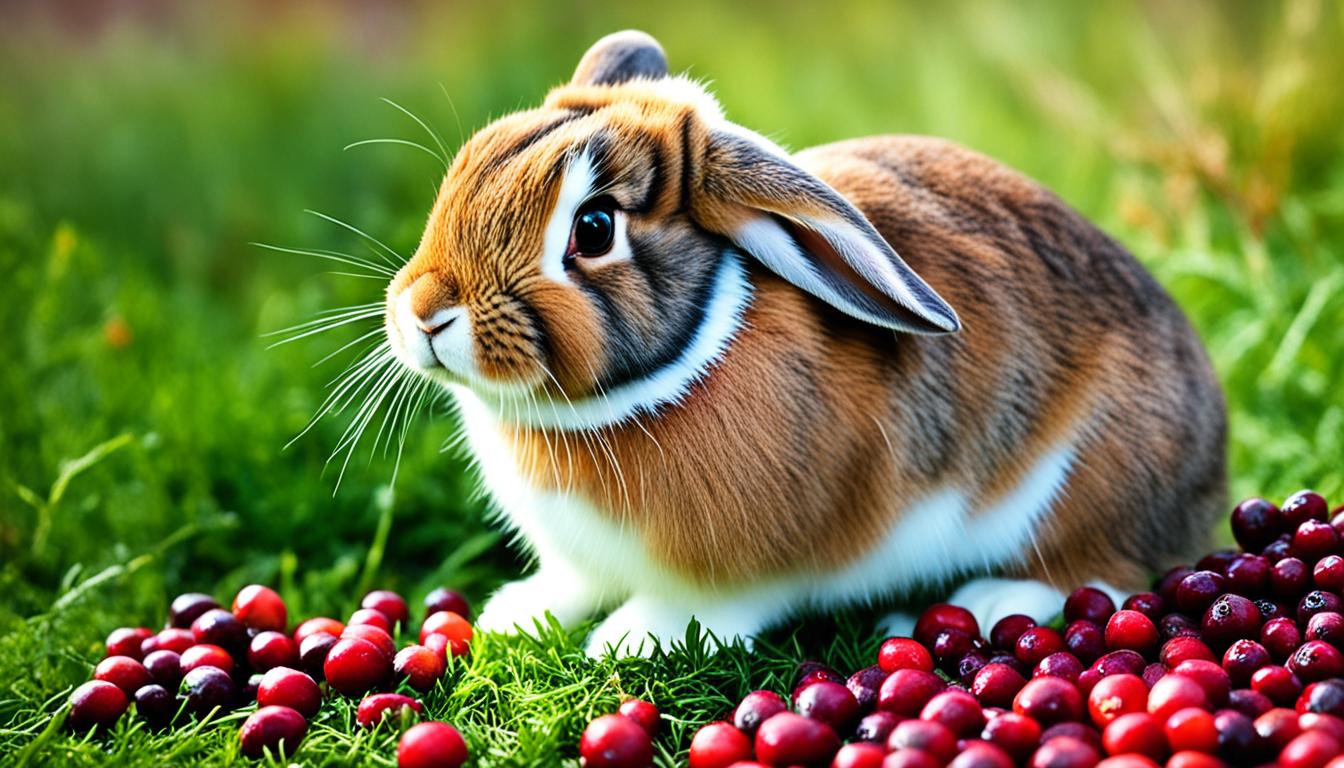
Did you know that rabbits can enjoy the tart and juicy goodness of cranberries? While some fruits may not be safe for our furry friends, cranberries are a healthy and nutritious treat that can be added to their diet. Not only are cranberries rich in vitamins and minerals, but they also provide various health benefits for rabbits. Let’s take a closer look at how cranberries can be a tasty supplement to your bunny’s diet, all while prioritizing their health and well-being.
Key Takeaways:
- Cranberries can be a safe and enjoyable treat for rabbits when given in moderation.
- They are rich in vitamins, minerals, and antioxidants, which promote a healthy immune system and overall well-being in rabbits.
- It’s important to feed cranberries as a treat and not as a staple food to avoid digestive issues.
- Moderation is key when incorporating cranberries into a rabbit’s diet, and the recommended portion is a teaspoon of fruit per two pounds of body weight, once or twice a week.
- Dried cranberries should be offered in small amounts due to their higher sugar content.
The Health Benefits of Cranberries for Rabbits
Cranberries offer several health benefits for rabbits. They are rich in vitamins and antioxidants, which can help protect against issues like cancer, heart disease, arthritis, and cognitive decline. The antioxidants in cranberries also aid in reducing inflammation and promoting a healthy digestive system. Additionally, cranberries contain important minerals like potassium, copper, calcium, and magnesium, which contribute to overall good health in rabbits.
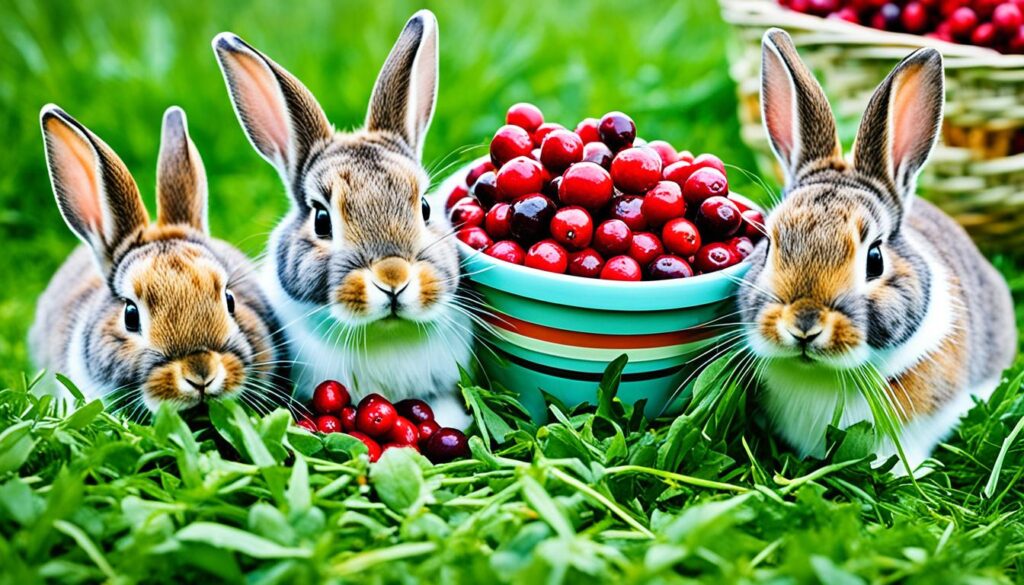
“Cranberries are a nutritional powerhouse for rabbits, providing them with essential vitamins and minerals that support their overall well-being.” – Dr. Alice Johnson, Rabbit Specialist
While cranberries are not a cure-all solution, they can help strengthen a rabbit’s body and promote a longer, healthier life. Adding cranberries to a rabbit’s diet can be a flavorful and nutritious way to enhance their well-being.
Moderation is Key: How Much Cranberry Can a Rabbit Have?
When it comes to incorporating cranberries into a rabbit’s diet, moderation is key. While these tart fruits offer several health benefits, overfeeding can lead to digestive issues due to their high water and sugar content.
As a general guideline, it’s recommended to give rabbits a teaspoon of fruit per two pounds of body weight, once or twice a week. This ensures that rabbits can enjoy the nutritional benefits of cranberries without overloading their systems. Remember, fruits, including cranberries, should be treated as treats and not be given on a daily basis.
If a rabbit consumes too many cranberries, they may experience stomach upset. Signs of digestive discomfort may include diarrhea or soft stool. In such cases, it’s best to stop feeding fruit for a few days and offer hay and dark green leaves instead, which can help restore balance to the rabbit’s digestive system.
The Importance of Moderation
Feeding fruits, including cranberries, in moderation is crucial for maintaining a rabbit’s overall health. Overfeeding rabbits on fruits can contribute to weight gain and potential health issues like obesity, which may lead to other complications.
By following the recommended guidelines and practicing moderation, rabbits can enjoy the occasional treat of cranberries while maintaining a balanced and nutritious diet.
Monitoring Your Rabbit’s Well-being
It’s essential to monitor your rabbit’s well-being and adjust their diet accordingly. Every rabbit is unique, and their dietary needs may vary based on factors such as age, weight, and overall health.
If you notice any changes in your rabbit’s appetite, behavior, or digestive health after introducing cranberries or any new food, consult with a veterinarian. They can provide personalized recommendations and ensure that your rabbit’s diet remains balanced and suitable for their specific needs.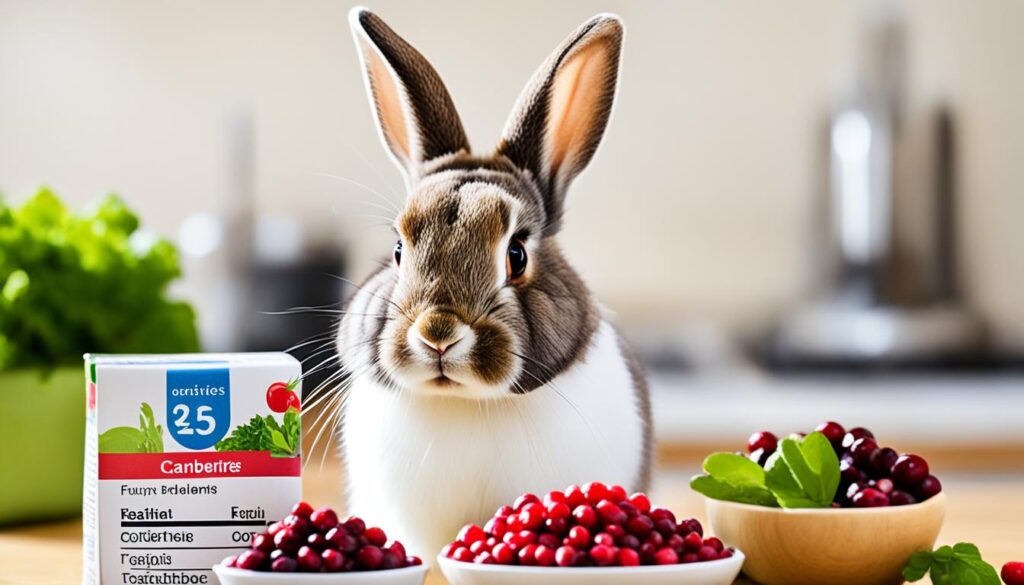
Summary of Cranberry Consumption for Rabbits
| Cranberry Consumption | Frequency |
|---|---|
| A teaspoon of cranberries per two pounds of body weight | Once or twice a week |
Inmoderation, cranberries can be a healthy addition to a rabbit’s diet. However, it’s essential to provide them in limited amounts, as overfeeding can lead to digestive issues and potential health problems. By following the recommended guidelines and monitoring your rabbit’s well-being, you can ensure they enjoy the benefits of cranberries without any adverse effects.
Dried Cranberries for Rabbits: Is It Safe?
While dried cranberries are not directly harmful to rabbits, it’s important to offer them in moderation due to their high sugar concentration. Dried fruits, including dried cranberries, have a higher sugar content than fresh fruits because of the reduced water content. Therefore, it’s crucial to choose dried cranberries without any additives and offer them sparingly.
Adding one or two dried cranberries a couple of times a week to your rabbit’s diet should be sufficient. Remember, dried cranberries should be considered as an occasional treat rather than a staple food in their bunny diet.
| Pros of Dried Cranberries for Rabbits | Cons of Dried Cranberries for Rabbits |
|---|---|
|
|
Additionally, it’s crucial to provide fresh water alongside dried cranberries to ensure proper hydration for your rabbit.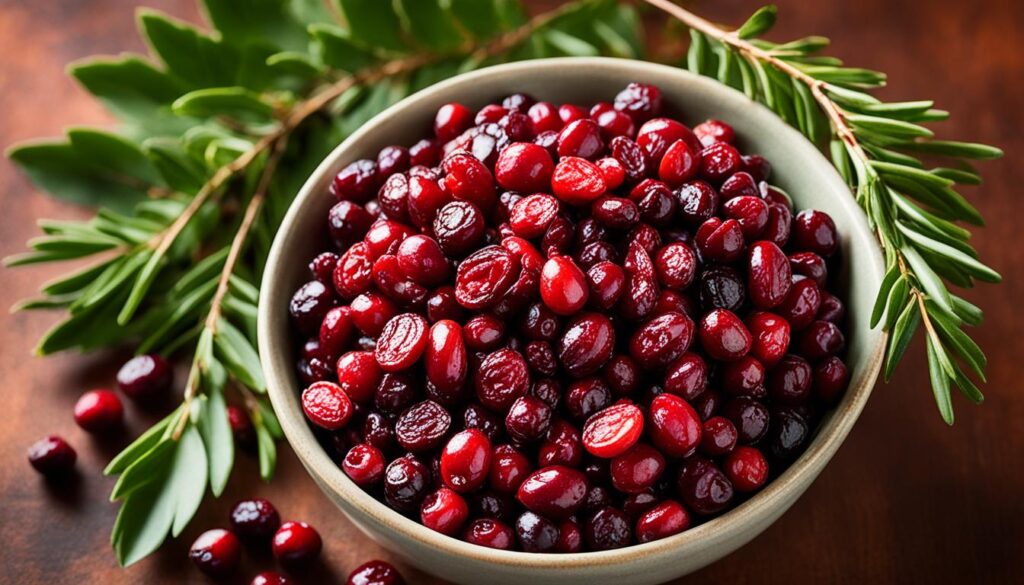
Can Rabbits Have Cranberry Juice?
No, rabbits should not be given cranberry juice. Rabbits need fiber, and juicing a fruit removes all the fiber, leaving only the concentrated sugar. Cranberry juice can cause a significant insulin spike in a rabbit’s body, which can be detrimental to their organs. It’s best to stick to fresh fruits, which contain more fiber and are better balanced for a rabbit’s diet.
Creating a Balanced Rabbit Diet
A balanced rabbit diet consists of several components. To ensure your furry friend stays healthy and happy, it’s important to provide them with a well-rounded diet that meets their nutritional needs.
The Importance of Hay
Hay should be the staple of a rabbit’s diet and should make up 80-90% of their daily food intake. The high fiber content in hay helps maintain proper digestive health and prevents issues like gastrointestinal stasis. Grass hays, such as Timothy, orchard grass, brome, and oat hay, are recommended choices for your rabbit’s hay.
High-Fiber Pellets
In addition to hay, rabbits should be given a small quantity of pellets that have a high fiber content. These pellets provide essential nutrients and support the overall well-being of your rabbit. When choosing pellets for your bunny, opt for those without added sugars, preservatives, or artificial colors. Consult your veterinarian for recommendations on portion size and suitable brands.
Incorporating Vegetables and Herbs
Vegetables and herbs can be included in a rabbit’s diet to provide variety and additional nutrients. However, it’s essential to introduce new foods gradually to avoid digestive issues. Some safe options include leafy greens like romaine lettuce, kale, and cilantro. Avoid feeding rabbits vegetables that are high in starch or high in oxalic acid, such as broccoli or spinach, as they can cause harm in excessive amounts. Always wash vegetables thoroughly and remove any pesticides before offering them to your rabbit.
Moderate Fruit Treats
Fresh fruit can be given to rabbits once or twice a week as a treat. While fruits contain essential vitamins and minerals, they are also high in sugar, so moderation is key. Some suitable fruit options for rabbits include apples, berries, and melons. Remember to remove any seeds or pits and wash the fruit thoroughly before giving it to your bunny.
Choosing Rabbit Treats Wisely
Rabbit treats should be fed sparingly and chosen carefully. Opt for treats that are specifically made for rabbits and free from added sugars, preservatives, and artificial colors. These treats should be given occasionally to prevent overfeeding and maintain a healthy weight for your rabbit.
Constant Access to Fresh Water
Lastly, ensure that fresh water is available to your rabbit at all times. This is crucial for their overall health and hydration. Regularly check and refill their water bowl or bottle to provide a continuous supply of clean water.
By following these guidelines and providing a balanced rabbit diet of hay, pellets, vegetables, fruit, and fresh water, you can ensure that your bunny receives all the necessary nutrients for a happy and healthy life.
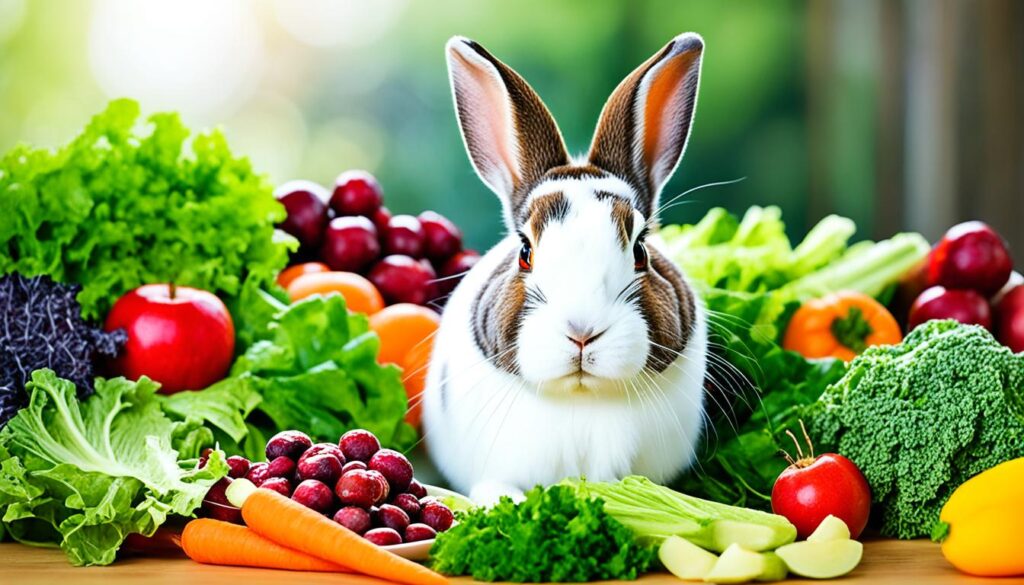
| Components of a Balanced Rabbit Diet | Serving Size/ Frequency |
|---|---|
| Hay (Timothy, orchard grass, brome, oat hay) | 80-90% of daily food intake |
| High-fiber pellets | Small quantity |
| Vegetables and herbs (e.g., romaine lettuce, kale, cilantro) | Introduced gradually |
| Fruits (e.g., apples, berries, melons) | Once or twice a week as a treat |
| Rabbit treats | Sparingly and free from added sugars, preservatives, and artificial colors |
| Fresh water | Constant availability |
Conclusion
In conclusion, cranberries can be a healthy addition to a rabbit’s diet. These tart berries are packed with essential vitamins and minerals that contribute to a rabbit’s overall health. However, it is important to offer cranberries in moderation, as they should be considered a treat rather than a daily staple. Overfeeding rabbits on cranberries or any fruits can lead to digestive issues and potential health problems.
To ensure a balanced bunny diet, it is recommended to include a variety of components such as hay, pellets, vegetables, and a limited amount of fruit. Hay should make up the majority of a rabbit’s diet, serving as a crucial source of fiber. High-fiber pellets and fresh vegetables can provide additional nutrients while promoting healthy digestion.
Regular monitoring of a rabbit’s weight is important to prevent obesity and other health issues. Adjusting their diet accordingly and consulting with a veterinarian for specific dietary recommendations can help ensure a rabbit’s well-being. Remember, a healthy rabbit diet is the key to a happy and thriving pet.
FAQ
Can rabbits eat cranberries?
What are the health benefits of cranberries for rabbits?
How much cranberry can a rabbit have?
Is it safe for rabbits to eat dried cranberries?
Can rabbits have cranberry juice?
What should a balanced rabbit diet consist of?
Can rabbits eat cranberries as a staple food?
Laura is a versatile writer and editor whose passion for animals shines through in her work. With a keen understanding of language and a love for storytelling, Laura crafts compelling narratives that captivate our audience and inspire action regarding animal welfare. Whether she’s delving into the latest research or sharing heartwarming stories of animal companionship, Laura’s work will leave a lasting impression on all who read it.
Rabbits
Toxic Food for Rabbits: Safe Diet Guide
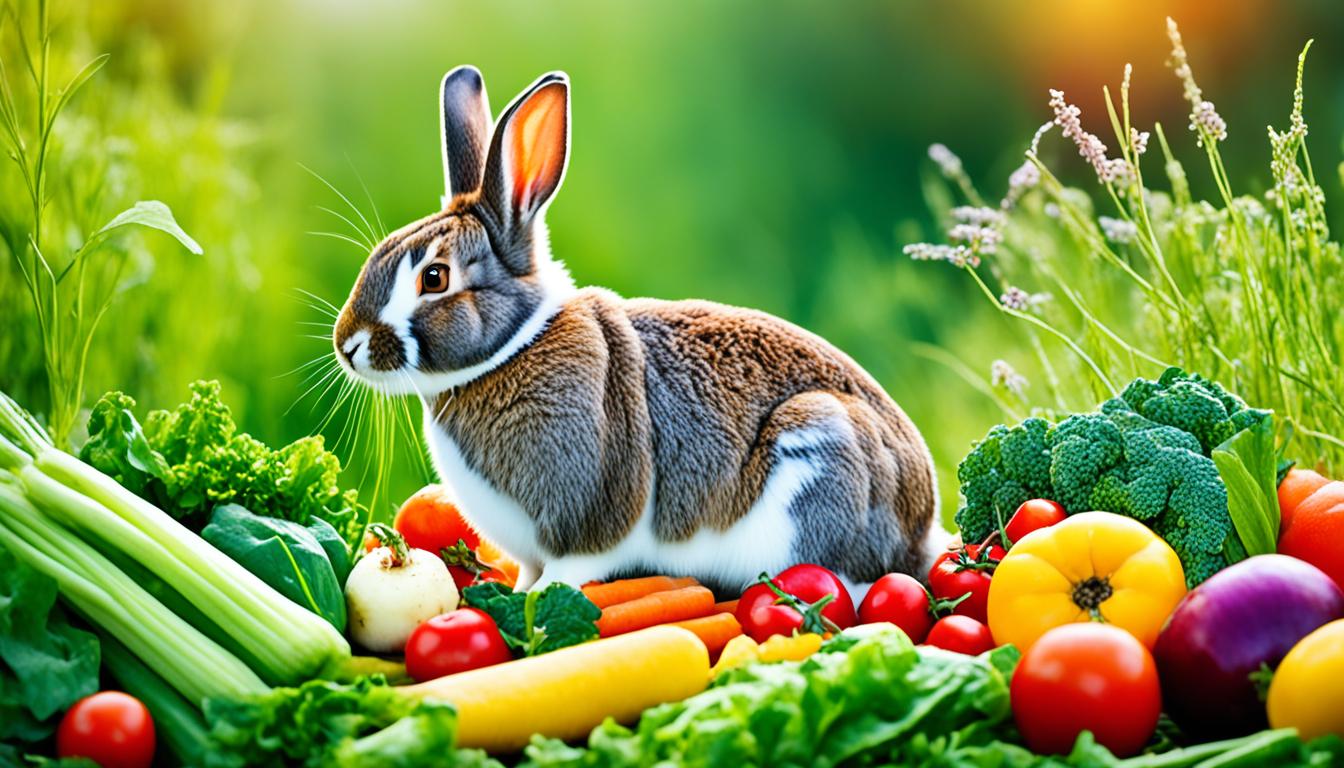
Rabbits have a distinctive digestive system that necessitates close monitoring of their diet. Certain foods can be harmful or even toxic to rabbits if consumed. It is crucial for rabbit owners to know about these foods to ensure the well-being and safety of their beloved pets.
Rabbits are herbivores and their diet should primarily consist of fresh hay, high-quality pellets, and a variety of fresh fruits and vegetables. However, there are certain foods that should be avoided to prevent any potential health issues in rabbits.
Key Takeaways:
- Avoid giving rabbits yogurt drops and other high-sugar treats as they can disrupt their digestion.
- Never include avocado in a rabbit’s diet as it can cause breathing trouble and heart complications.
- Avoid giving rabbits processed human food like cereal and iceberg lettuce as they can cause tummy problems.
- Hamster food and walnuts should be avoided as they do not provide the necessary nutrition for rabbits.
- Oatmeal, chocolate, and peanut butter should also be avoided as they can cause digestive upset.
Foods to Avoid: Yogurt Drops and High-Sugar Treats
When it comes to treating your rabbit, it’s important to choose their snacks wisely. Some treats can be harmful to their health, so it’s crucial to avoid certain toxic foods and opt for safer alternatives.
Two popular treats that should be avoided are yogurt drops and high-sugar treats. While these may seem like a delicious treat for your furry friend, they can actually have negative effects on their digestive system.
“Yogurt drops and high-sugar treats can potentially lead to enterotoxemia, a toxic overgrowth of ‘bad’ bacteria in the intestinal tract,”
These treats can disrupt your rabbit’s digestion and cause stomach issues. Consuming too much sugar can also lead to weight gain and dental problems. It’s best to avoid these high-sugar treats altogether and look for healthier alternatives.
Instead of yogurt drops and other sugary snacks, consider providing your rabbit with healthier treats. Green peppers and Brussels sprouts are excellent options that are low in sugar and rich in essential nutrients. These treats not only provide a tasty reward, but they also contribute to a balanced diet for your rabbit.
Benefits of Green Peppers:
| Treat | Nutritional Benefits |
|---|---|
| Green Peppers | High in vitamin C, which supports your rabbit’s immune system |
Benefits of Brussels Sprouts:
| Treat | Nutritional Benefits |
|---|---|
| Brussels Sprouts | Rich in fiber, which aids in digestion and promotes overall gut health |
By choosing healthier treats for your rabbit, you can ensure that they receive the necessary nutrients while also avoiding the risks associated with toxic and high-sugar foods. Prioritizing your rabbit’s health and well-being is key to providing them with a happy and fulfilling life.
No Avocado for Rabbits
When it comes to the diet of rabbits, there are certain foods that can be extremely harmful, even deadly, if ingested. One such food that should be strictly avoided is avocado.
Avocado contains a natural chemical compound called persin, which can cause serious health issues for rabbits. The consumption of avocado by rabbits can lead to breathing difficulties and even heart complications. It’s crucial for rabbit owners to understand the dangers of avocado and refrain from including it in their pets’ diet.
Instead of avocado, there are plenty of other fresh fruits and vegetables that can be safely fed to rabbits. These options not only provide essential nutrients but also add variety to their diet. Some rabbit-friendly fruits and vegetables include:
- Leafy greens: Spinach, kale, and parsley
- Berries: Strawberries, blueberries, and raspberries
- Root veggies: Carrots, radishes, and beets
- Herbs: Basil, cilantro, and mint
These alternatives offer a range of flavors and textures that can keep rabbits interested in their meals. Additionally, they provide vital nutrients for their overall health and well-being.
The Dangers of Avocado
Avocado contains the toxic compound persin, which can have severe effects on a rabbit’s health. The chemical is primarily found in the skin, flesh, and even the leaves of the avocado plant.
When rabbits consume avocado, they may experience difficulty breathing due to swelling and irritation of the airways. This can lead to respiratory distress, causing considerable distress and discomfort for the animal.
In some cases, rabbits may also develop heart complications after ingesting avocado. These complications can lead to serious health problems and can even be fatal.
“Avocado should never be included in a rabbit’s diet as it can be deadly if ingested.”
Given the potential risks, it’s essential for rabbit owners to be aware of the dangers associated with avocado consumption and strictly avoid feeding it to their furry companions.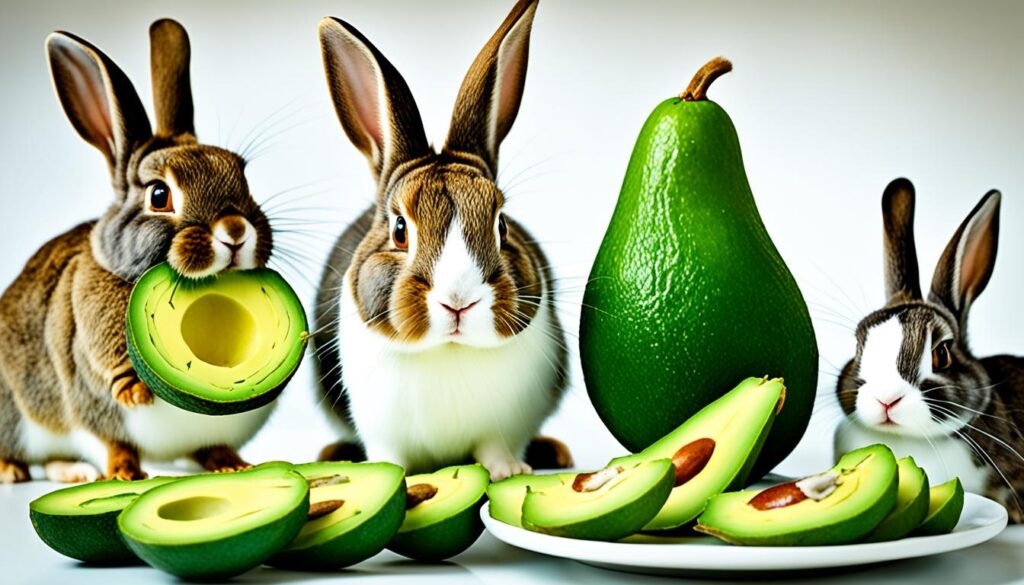
While avocado might be a popular and healthy food choice for humans, it should never be considered safe for rabbits. Their unique digestive system and sensitivity make it crucial to provide them with a carefully planned diet that excludes toxic foods.
By avoiding avocado and sticking to a nourishing and species-appropriate diet, rabbit owners can ensure the health and well-being of their beloved pets for years to come.
Cereal and Lettuce to Avoid
When it comes to feeding rabbits, it’s important to be mindful of the foods that can be toxic or harmful to them. Two foods that should be avoided in a rabbit’s diet are cereal and certain types of lettuce.
Avoid Cereal for Rabbits
Cereal, such as muesli, may seem harmless, but it can actually lead to dental and gastrointestinal issues in rabbits. The high carbohydrate content and added sugars in cereal can disrupt their delicate digestive system, causing discomfort and potentially serious health problems. Instead of giving rabbits processed human food like cereal, it’s best to focus on providing them with a diet that is more suited to their nutritional needs.
Toxic Lettuce for Rabbits
Iceberg lettuce, along with other light-colored lettuce varieties, should also be avoided in a rabbit’s diet. These types of lettuce can contain a chemical called lactucarium, which can be harmful to rabbits if consumed in large quantities. While small amounts of light-colored lettuce may not cause immediate harm, it’s best to err on the side of caution and opt for darker and more nutritious leafy greens instead. Not only are darker greens better for rabbits’ overall health, but they also provide a variety of essential vitamins and minerals that they need to thrive.
In summary, when it comes to feeding rabbits, it’s important to steer clear of toxic foods. Cereal and light-colored lettuce should be avoided to ensure the well-being of these small and sensitive animals. Providing a balanced diet that includes a variety of fresh, nutrient-rich foods will help keep rabbits healthy and happy.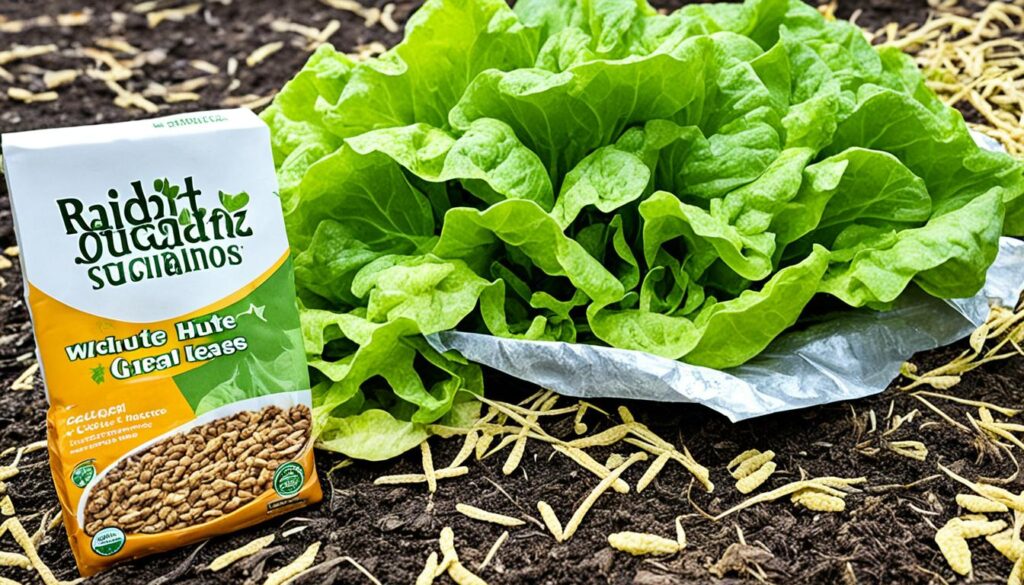
Harmful Foods: Hamster Food and Walnuts
When it comes to providing a safe and nutritious diet for your rabbits, there are certain foods that should be avoided. Hamster food and walnuts, while not necessarily toxic, can have negative effects on your rabbits’ health.
Hamster Food: While it may seem tempting to feed your rabbits hamster food, it is not suitable for their dietary needs. Hamster food is formulated specifically for hamsters and does not provide the necessary high-fiber content that rabbits require. Feeding your rabbits hamster food can lead to nutritional deficiencies and digestive issues. It’s best to opt for a rabbit-specific pellet diet that meets their dietary requirements.
Walnuts: Although walnuts are not toxic to rabbits, they can cause uncomfortable indigestion due to their high fat content. Rabbits have sensitive digestive systems that are best suited for a high-fiber diet. Consuming fatty foods like walnuts can lead to gastrointestinal upset, including diarrhea and bloating. Instead of offering walnuts as a snack, it’s recommended to provide fresh vegetables and herbs that are low in fat and high in nutrients.
To ensure your rabbits’ health and well-being, it’s important to avoid feeding them hamster food and walnuts. Instead, focus on providing them with a balanced diet that includes high-quality pellets, fresh hay, and a variety of rabbit-safe vegetables and herbs.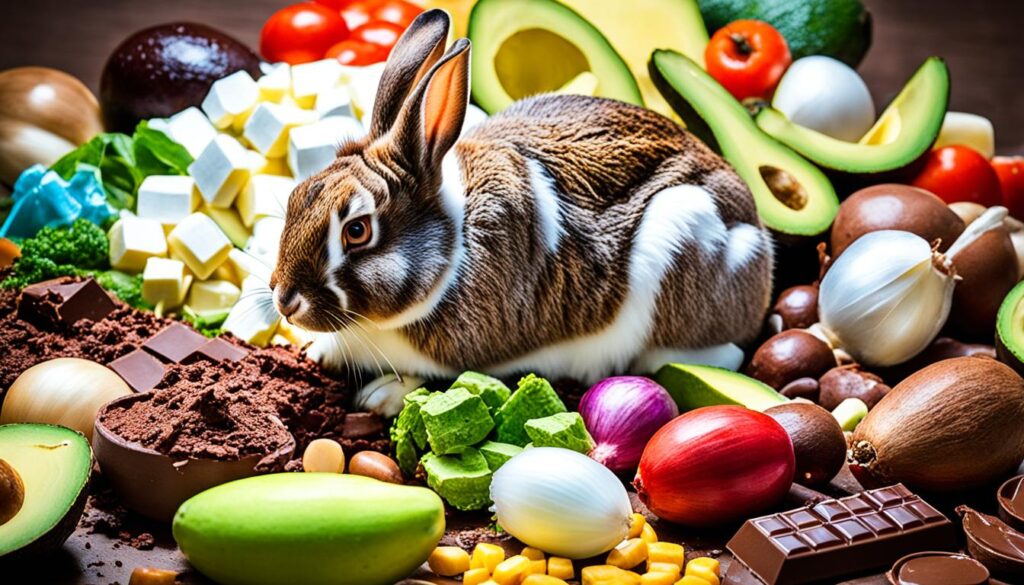
| Foods to Avoid | Reason |
|---|---|
| Hamster Food | Does not provide necessary high-fiber content |
| Walnuts | High fat content can cause indigestion |
Oatmeal, Chocolate, and Peanut Butter Are No-Nos
While oatmeal won’t cause major harm to rabbits, it is not an ideal meal for them. Rabbits require large amounts of Timothy hay, hearty greens, and fresh water for a nutritious diet. Chocolate and peanut butter, both high in fat, should be avoided as they can cause digestive upset and discomfort for rabbits.
“Proper nutrition is essential for the well-being of rabbits. While oatmeal is often considered a healthy option for humans, it does not provide the necessary nutrients that rabbits need. It’s important to focus on their dietary needs by offering a diet rich in fiber and low in fat.”
To ensure a well-rounded and healthy diet for rabbits, it’s important to avoid toxic food and provide them with a variety of nutritious options. Feeding them high-quality hay, fresh vegetables, and limited amounts of pellets is key to maintaining their overall health.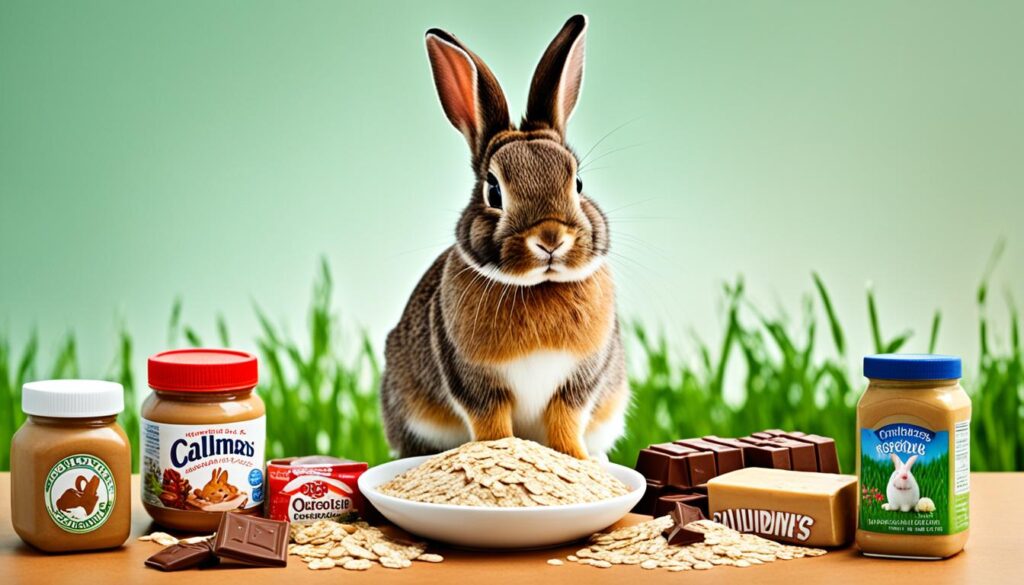
| Foods to Avoid | Reason |
|---|---|
| Oatmeal | Not nutritionally beneficial for rabbits |
| Chocolate | High in fat and can cause digestive issues |
| Peanut Butter | High in fat and can cause digestive discomfort |
By being mindful of their diet and avoiding toxic foods, owners can ensure that their rabbits lead healthy and happy lives.
Key Takeaways:
- Oatmeal does not provide the necessary nutrients for rabbits and should be avoided.
- Chocolate and peanut butter, high in fat, can cause digestive upset in rabbits and should be omitted from their diet.
- Rabbits require a diet rich in Timothy hay, hearty greens, and fresh water to maintain their overall health.
Potatoes, Rhubarb, and Meat: Not Good for Rabbits
While rabbits are known to have an insatiable appetite, it’s important to remember that not all foods are suitable for their delicate digestive systems. In this section, we’ll explore three common foods that are best avoided when it comes to feeding your furry friend: potatoes, rhubarb, and meat.
Potatoes
Potatoes may be a staple in many human diets, but they should not be a part of a rabbit’s menu. While not inherently toxic, potatoes are high in carbohydrates and starch, which can lead to digestive issues for rabbits. These starchy vegetables can cause bloating, gas, and discomfort in your furry friend’s sensitive stomach. It’s best to steer clear of feeding potatoes to rabbits and opt for other vegetables that are more suitable for their needs.
Rhubarb
Raw rhubarb is another food that should be kept away from rabbits. While humans may enjoy rhubarb pies and desserts, the leaves of the rhubarb plant contain a substance called oxalic acid, which is toxic to rabbits. If ingested, rhubarb can cause dehydration, lethargy, and even kidney failure in rabbits. It’s important to ensure that rabbits are not exposed to rhubarb in any form, whether it’s raw, cooked, or in processed foods.
Meat
It may seem obvious, but rabbits are herbivores and do not require or digest meat as part of their diet. Feeding meat to rabbits can cause severe health issues and disrupt their delicate digestive balance. Rabbits are not equipped to handle the high protein and fat content in meat, which can lead to digestive upset, obesity, and other health complications. It’s essential to stick to a plant-based diet for rabbits and provide them with the appropriate mix of hay, pellets, and fresh vegetables.
By avoiding toxic food for rabbits, such as potatoes, rhubarb, and meat, you can ensure that your furry friend’s digestive system stays healthy and happy. Instead, focus on providing a balanced diet consisting of high-quality hay, fresh vegetables, and pellets specifically formulated for rabbits. Remember, consulting with a veterinarian is always a good idea when planning your rabbit’s diet to ensure they receive the nutrients they need to thrive.
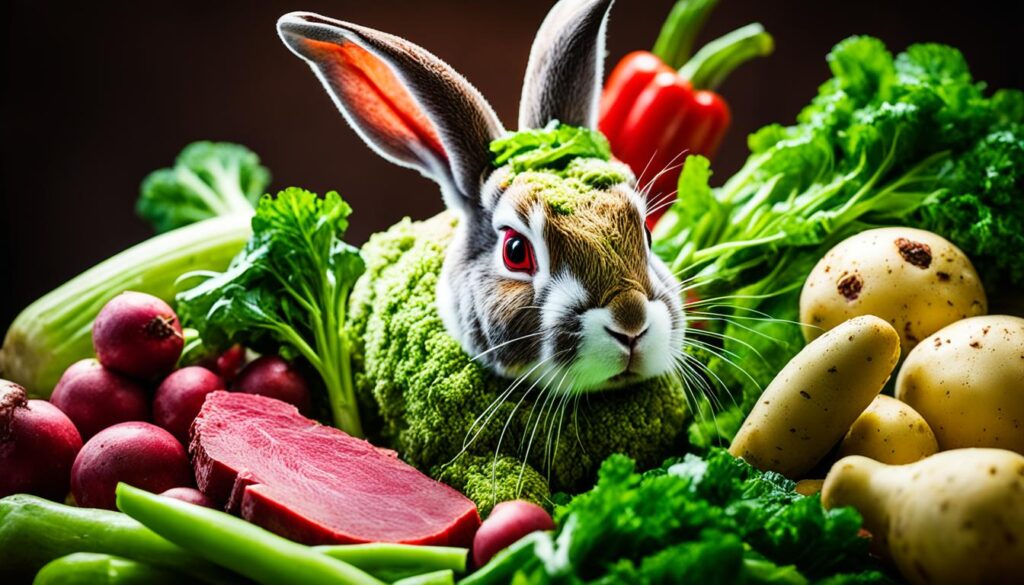
Cauliflower, Seeds, and Nuts
When it comes to the diet of rabbits, it’s important to be mindful of certain foods that can be harmful or even toxic to them. Cauliflower, while a nutritious vegetable for humans, can cause bloating and gas in rabbits. To provide rabbits with a healthier alternative, consider offering green peppers, beets, or radishes as snack options.
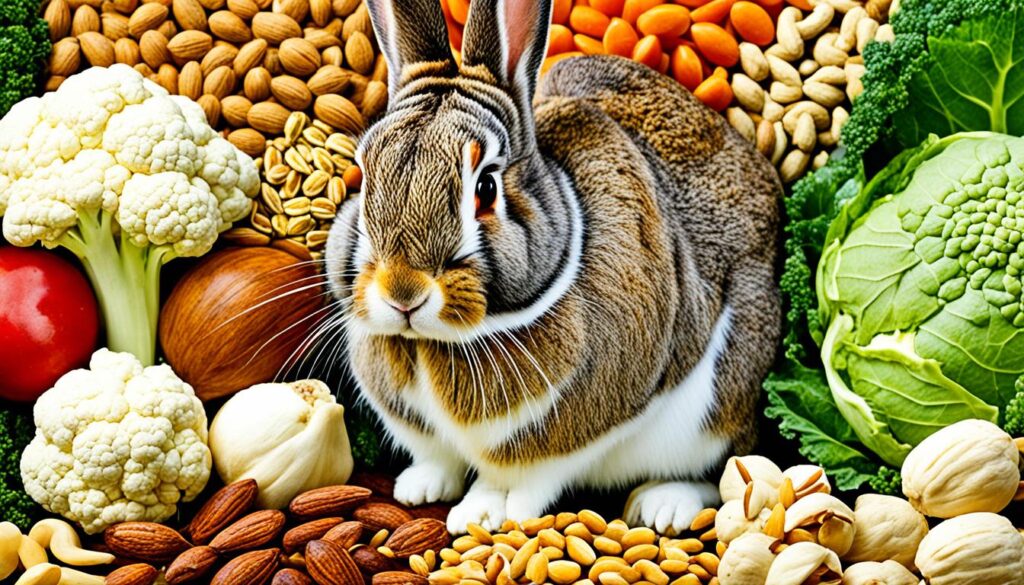
Additionally, most seeds and nuts should be avoided in a rabbit’s diet, as they can pose potential health risks. Rabbits have sensitive digestive systems that may not tolerate seeds and nuts well. However, there are a few exceptions. Sunflower seeds and pumpkin seeds can be given to rabbits in small quantities as occasional treats.
It’s important to remember that a rabbit’s diet should primarily consist of hay, fresh vegetables, and water. These provide the necessary fiber and nutrients for their digestive health. By avoiding toxic foods and incorporating a balanced diet, you can ensure the well-being and longevity of your rabbit companion.
Poisonous Plants for Rabbits
Rabbits have a curious nature and may explore their surroundings by nibbling on plants. However, it’s important to be aware that some plants can be toxic to rabbits. To keep your furry friend safe, it’s crucial to avoid exposing them to poisonous plants. Here are some plants that are harmful to rabbits:
| Plant | Toxic Parts |
|---|---|
| Aloe | Leaves |
| Apple seeds | Seeds |
| Apricot plants | Leaves, stems, and pits |
| Avocado leaves | Leaves |
| Azalea | All parts |
| Begonia | All parts |
| Chrysanthemum | All parts |
| Ivy | All parts |
These plants contain substances that can be toxic to rabbits if ingested. It’s important to keep them out of your rabbit’s reach and ensure that your rabbit’s living area is free from these poisonous plants.
To provide a visual representation, here is an image of some of the poisonous plants:
Remember, prevention is key when it comes to protecting your rabbit’s health. By being aware of the potentially toxic plants and avoiding them, you can ensure the well-being of your beloved pet.
Best Practices for Rabbit Diet and Treats
In addition to avoiding toxic foods, providing rabbits with a healthy and balanced diet is essential for their overall well-being. A proper diet ensures that rabbits receive all the necessary nutrients they need to thrive. Here are some best practices to follow when it comes to rabbit diet and treats:
The Importance of Hay, Pellets, and Fresh Produce
Hay, such as Timothy hay, should make up the bulk of a rabbit’s diet. It provides essential fiber, aids in digestion, and helps wear down their teeth, which continuously grow. Unlimited access to fresh hay is crucial for a healthy rabbit diet.
High-quality pellets formulated specifically for rabbits can supplement their diet. Choose pellets that are made primarily from hay and avoid those with excessive fillers or added sugars. Pellets should make up a smaller portion of their diet and be given in appropriate quantities, based on their size and weight.
Adding a variety of fresh fruits and vegetables is important to provide additional vitamins and minerals to rabbits’ diets. However, not all fruits and vegetables are safe for rabbits. Refer to a rabbit diet guide or consult with a veterinarian for a comprehensive list of safe options. Rotate the types of produce regularly to ensure a well-rounded diet.
Moderation with Rabbit Treats
While treats can be a fun way to interact with rabbits and provide them with extra enjoyment, they should be given in moderation. Treats should never exceed 10% of a rabbit’s daily food intake. Too many treats can lead to weight gain, digestive issues, and an unbalanced diet.
When choosing treats for rabbits, opt for healthy options that align with their dietary needs. Fresh vegetables, such as carrot tops, bell peppers, and cilantro, can make excellent treats. Dried flowers and leaves, like chamomile or dandelion, can also be enjoyable treats for rabbits.
Consultation with a Veterinarian
Every rabbit is unique, and their dietary requirements may vary based on factors such as age, weight, and health conditions. It’s crucial to consult with a veterinarian who specializes in small animals or exotic pets to ensure that you are providing the best diet for your rabbit.
A veterinarian can provide personalized recommendations on the types and quantities of treats to give to your rabbit, as well as any modifications necessary based on their specific needs. Regular check-ups with a veterinarian will help monitor your rabbit’s overall health and ensure that their diet is promoting their well-being.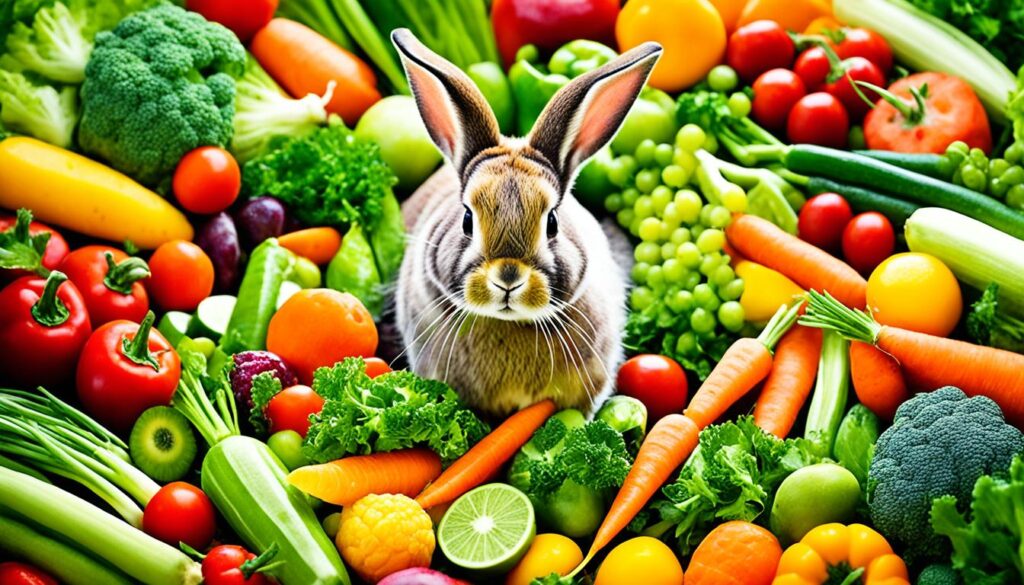
| Treat Options | Description |
|---|---|
| Fresh vegetables | Carrot tops, bell peppers, cilantro |
| Dried flowers and leaves | Chamomile, dandelion |
Common Myths and Misconceptions about Rabbit Diet
When it comes to feeding rabbits, there are several common myths and misconceptions that can lead to a less than ideal diet. These misconceptions often arise from misleading marketing practices and outdated beliefs. It’s important for rabbit owners to be aware of these myths and ensure that they are providing their furry friends with a diet that meets their nutritional needs. Let’s debunk some of the most prevalent rabbit diet myths:
- Myth 1: Rabbits can survive on a diet of only pellets.
- Myth 2: Unlimited amounts of fruits and vegetables are beneficial for rabbits.
- Myth 3: Rabbits don’t need access to fresh water.
- Myth 4: Rabbits need a constant supply of seeds and nuts.
- Myth 5: Feeding rabbits only one type of hay is sufficient.
This myth stems from the misconception that pellets alone provide all the necessary nutrients for rabbits. While pellets are an important part of a rabbit’s diet, they should be supplemented with fresh hay, vegetables, and a small amount of fruit to ensure a balanced and healthy diet.
While it’s true that rabbits enjoy fruits and vegetables, unlimited consumption can lead to digestive problems. Fruits and vegetables should be given in moderation as treats, and the focus of a rabbit’s diet should be on high-quality hay and pellets.
Water is essential for a rabbit’s overall health and digestion. Rabbits should always have access to fresh, clean water. Water bowls or bottles should be cleaned regularly to ensure hygiene.
While seeds and nuts can be given as occasional treats, they should not be a staple in a rabbit’s diet. These foods are high in fat and can lead to weight gain and digestive issues if overfed. Stick to small quantities as occasional rewards.
Rabbits require a variety of hays in their diet to ensure optimal nutrition and gut health. Different types of hay, such as Timothy, orchard grass, and oat hay, provide different nutrients and textures, which are beneficial for rabbits’ dental health and overall well-being.
By debunking these myths and misconceptions, rabbit owners can ensure that their pets are getting the proper nutrition they need for a healthy and happy life. It’s always best to consult with a veterinarian for personalized guidance on rabbit diet and nutrition.
Rabbit Diet Myths Debunked!
| Myth | Fact |
|---|---|
| Rabbits can survive on a diet of only pellets. | Pellets should be supplemented with hay, vegetables, and a small amount of fruit. |
| Unlimited amounts of fruits and vegetables are beneficial for rabbits. | Fruits and vegetables should be given in moderation as treats. |
| Rabbits don’t need access to fresh water. | Rabbits should always have access to fresh, clean water. |
| Rabbits need a constant supply of seeds and nuts. | Seeds and nuts should be given as occasional treats in small quantities. |
| Feeding rabbits only one type of hay is sufficient. | Rabbits require a variety of hays in their diet to ensure optimal nutrition. |
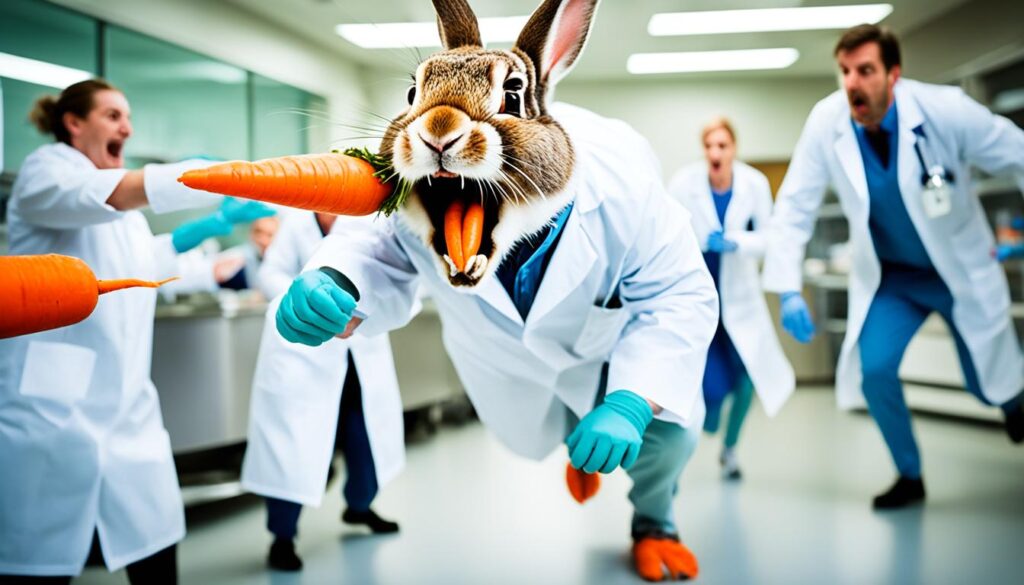
Conclusion
Understanding the importance of a safe diet for rabbits is essential for every conscientious pet owner. By being aware of the toxic foods and harmful treats, rabbit owners can ensure the well-being and longevity of their furry companions.
Creating a balanced and nutritious diet, including unlimited amounts of hay, high-quality pellets, and a variety of fresh fruits and vegetables, is crucial for a rabbit’s overall health. Avoiding foods like yogurt drops, high-sugar treats, avocado, cereal, lettuce, hamster food, walnuts, oatmeal, chocolate, peanut butter, potatoes, rhubarb, meat, cauliflower, seeds, and nuts is vital to prevent digestive issues and potential toxicity.
When it comes to providing treats, it’s best to opt for healthy alternatives like fresh veggies, dried flowers, and leaves, while always ensuring moderation. Consulting with a veterinarian for personalized guidance on rabbit’s diet and nutrition is highly recommended.
By following these guidelines and maintaining a safe and balanced diet, rabbit owners can keep their precious pets happy, healthy, and thriving for years to come.FAQ
What are some foods to avoid feeding rabbits?
Why should yogurt drops and high-sugar treats be avoided for rabbits?
Why should avocados be avoided in a rabbit’s diet?
Why should cereal and lettuce be avoided for rabbits?
Why shouldn’t rabbits be fed hamster food and walnuts?
Why should oatmeal, chocolate, and peanut butter be avoided for rabbits?
Why should potatoes, raw rhubarb, and meat be avoided in a rabbit’s diet?
Why should cauliflower, most seeds and nuts, and certain plants be avoided for rabbits?
What plants are poisonous to rabbits?
What is the best practice for rabbit diet and treats?
What are some common myths and misconceptions about rabbit diet?
As our Editor-in-Chief, James plays a pivotal role in ensuring the quality and integrity of our content. With a keen eye for detail and a passion for storytelling, James oversees the editorial process here at A Place for Animals. With years of experience in content editing, James ensures that every piece of content meets our high standards of accuracy and clarity. Under James’ guidance, you can rest assured that the content you read is informative and impeccably crafted.
Rabbits
How Rabbits Can Safely Eat Romaine Lettuce
Looking to feed your rabbit romaine lettuce? Discover the essential guidelines to keep your bunny safe and healthy.
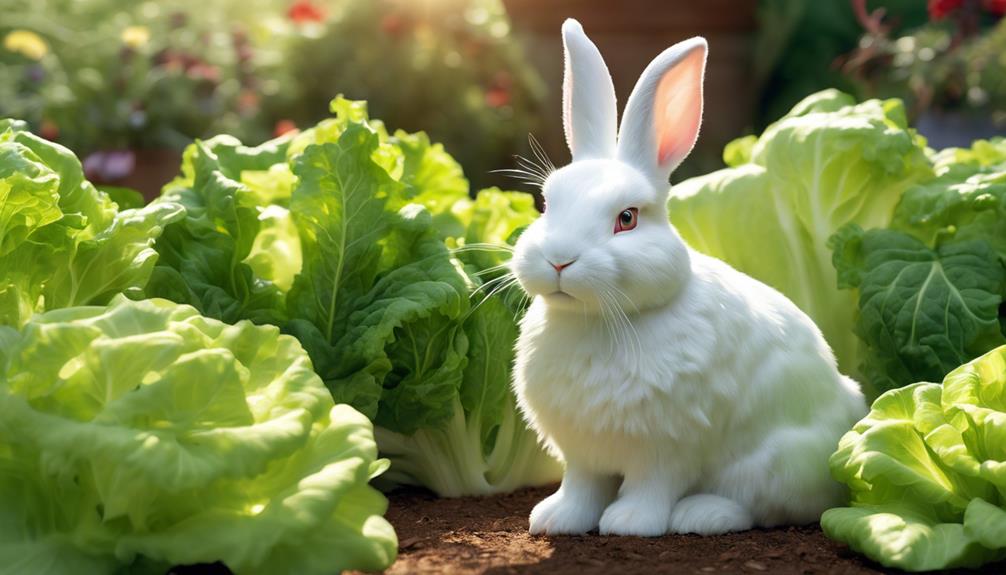
When feeding romaine lettuce to rabbits, it is crucial to take into account the benefits, risks, serving sizes, preparation steps, and monitoring techniques to ensure their safety. Romaine lettuce contains essential nutrients, vitamins, and hydration that are advantageous for rabbits, but feeding them too much can lead to digestive problems such as loose stools. To safeguard their health, it is important to provide the correct portion, chop the lettuce into small pieces, and thoroughly wash it before offering it to them. It is also vital to observe our furry companions for any changes in behavior or health to keep them content and happy. For more information on safely feeding romaine lettuce to our bunnies, click here.
Key Takeaways
- Introduce gradually to prevent digestive upsets.
- Serve in moderation to avoid loose stools.
- Mix with other greens for a balanced diet.
- Monitor for any adverse reactions.
- Ensure lettuce is washed and pesticide-free.
Benefits of Romaine Lettuce for Rabbits
Romaine lettuce provides rabbits with essential nutrients and hydration, making it a beneficial addition to their diet. This leafy green vegetable isn't only rich in vitamins A and K, important for organ function and bone strength in rabbits, but also boasts a high water content that aids in keeping our furry friends hydrated, especially important during warmer seasons.
The fiber found in romaine lettuce supports healthy digestion in rabbits, preventing issues and helping to maintain an ideal weight due to its low-calorie nature. When introducing romaine lettuce to a rabbit's diet, it's advisable to do so gradually to allow their digestive system to adjust smoothly, minimizing the risk of any potential gastrointestinal discomfort.
Risks of Feeding Romaine Lettuce
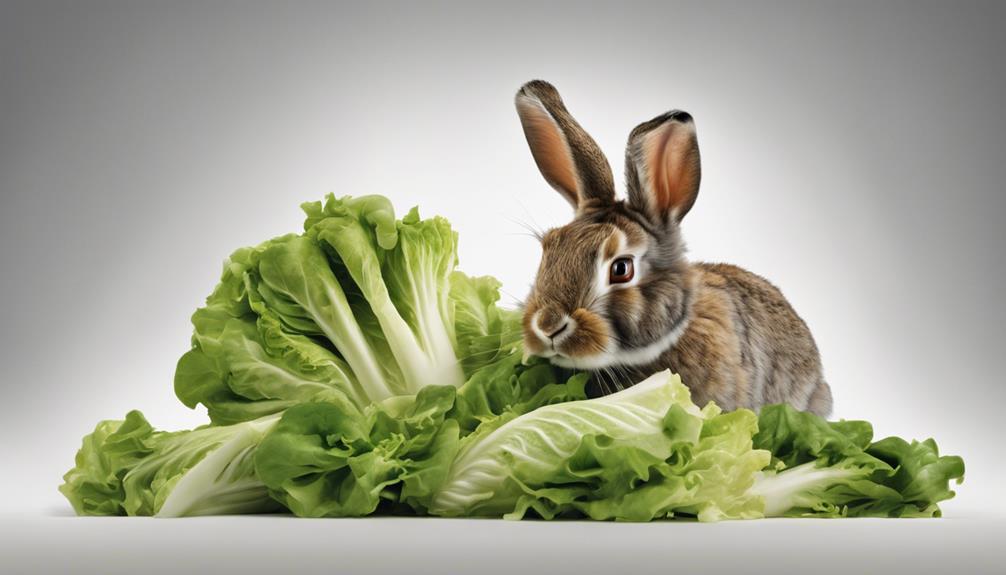
When incorporating romaine lettuce into a rabbit's diet, it's important to be mindful of the potential risks associated with overfeeding this leafy green. While romaine lettuce is safe for rabbits in moderation due to its high fiber content, overfeeding can lead to issues such as loose stools or diarrhea. Monitoring the calcium content in romaine lettuce is essential to prevent health issues, as excessive calcium intake can cause digestive upsets. It's advisable to introduce romaine lettuce gradually into a rabbit's diet to allow their digestive system to adjust and avoid any potential problems.
To maintain a balanced diet for rabbits, it's recommended to mix romaine lettuce with other leafy greens. This combination not only provides variety in their diet but also helps prevent any adverse effects from consuming too much of one type of green. By offering romaine lettuce in moderation and alongside other suitable vegetables, you can guarantee your rabbit enjoys the nutritional benefits without encountering digestive issues.
Proper Serving Size for Rabbits
Shifting from the hazards associated with overfeeding romaine lettuce, identifying the appropriate serving size for rabbits is vital to maintaining their dietary balance and well-being. When it comes to incorporating romaine lettuce into your rabbit's diet, it's recommended to serve around 1-2 cups of chopped lettuce per 2 pounds of body weight. Introduce this leafy green gradually to monitor for any digestive issues or sensitivities that your rabbit may have.
Romaine lettuce shouldn't be the sole focus of your rabbit's diet but rather a part of a balanced meal that includes other leafy greens and vegetables to ensure top-notch nutrition. It's critical to monitor your rabbit's weight regularly and adjust the serving size of romaine lettuce accordingly to keep them healthy. Additionally, always make sure the romaine lettuce is fresh, thoroughly washed, and free of any pesticides or harmful chemicals before feeding it to your rabbit. By following these guidelines, you can provide a safe and nutritious diet for your furry companion.
Preparing Romaine Lettuce for Rabbits
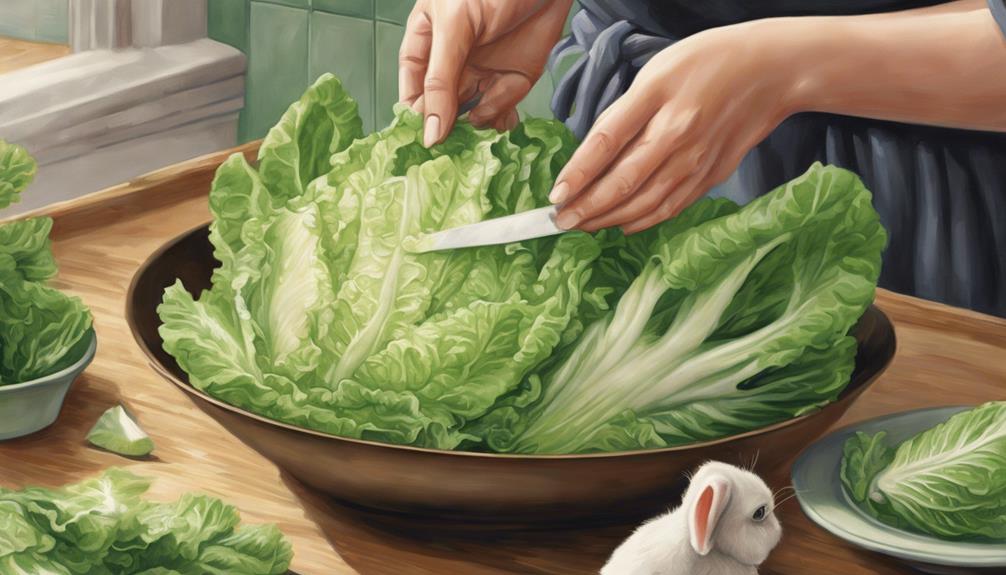
To prepare romaine lettuce for rabbits, ensure thorough washing to eliminate any potential contaminants that could compromise the rabbit's health. After washing, it is crucial to remove the core/stem of the romaine lettuce as it can be tough and challenging for rabbits to chew and digest. To make it simpler for rabbits to eat and prevent choking hazards, tear or chop the romaine lettuce into small, bite-sized pieces. This guarantees that the rabbits can consume the lettuce safely and enjoyably.
| Preparation Steps | Benefits for Rabbits |
|---|---|
| Wash thoroughly | Guarantee rabbit's health is not compromised |
| Remove core/stem | Make it easier for rabbits to chew and digest |
| Cut into small pieces | Avoid choking hazards |
Monitoring Rabbit's Reaction
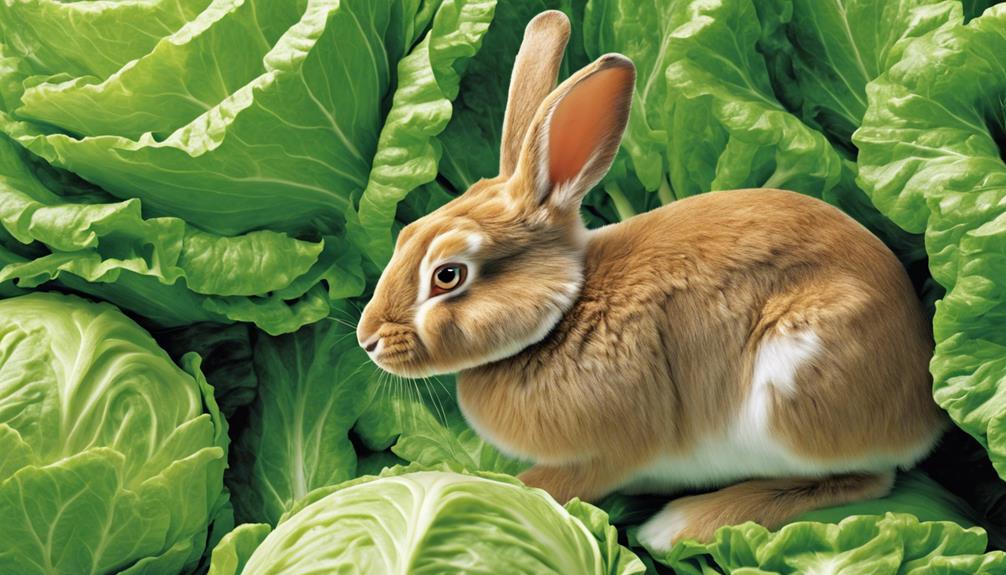
Upon introducing romaine lettuce to your rabbit, closely monitor their reactions for any signs of digestive issues or discomfort. Changes in appetite, stool consistency, or behavior can indicate how well your rabbit is tolerating the new addition to their diet.
Keep an eye out for any preferences your rabbit may show towards romaine lettuce compared to other greens; this can help you understand their likes and dislikes.
It's vital to track the amount of romaine lettuce your rabbit consumes to prevent any potential health issues that may arise from overeating this particular green. If you notice any negative reactions such as diarrhea, bloating, or lethargy, consulting a veterinarian promptly is crucial.
Your rabbit's well-being is paramount, and seeking professional advice can address any concerns about their digestive health and overall diet. Regular monitoring and quick action can safeguard your rabbit stays happy and healthy while enjoying romaine lettuce as part of their balanced diet.
Frequently Asked Questions
How Much Romaine Lettuce Can a Rabbit Eat?
We recommend offering rabbits a small amount of romaine lettuce a few times a week. Gradually introducing it can prevent digestive issues. Remember to pair it with other veggies for a balanced diet that keeps rabbits healthy and hydrated.
What Greens Can Rabbits Eat Daily?
We guarantee rabbits thrive by feeding them dark leafy greens like romaine lettuce daily. These nutrient-rich veggies, mixed with other greens, provide hydration and essential nutrients. Introduce new greens gradually for best digestion and health.
What if I Accidentally Fed My Rabbit Iceberg Lettuce?
If we accidentally fed our rabbit iceberg lettuce, we'd monitor for any digestive issues. Remember, iceberg lettuce lacks nutrition and can cause diarrhea. Safeguard your rabbit's health by choosing safer options like romaine lettuce for a balanced diet.
How Do You Know if a Rabbit Is Safe to Eat?
We assess a rabbit's safety for consumption by ensuring it displays no signs of illness, has a healthy appetite, and exhibits normal behaviors. Proper diet, environment, and regular veterinary check-ups contribute to maintaining a rabbit's well-being and safety.
Can Rabbits and Chickens Both Safely Eat Romaine Lettuce?
Yes, rabbits and chickens can both safely eat romaine lettuce. However, it’s important to know how to feed chickens lettuce. It should be given in moderation as a treat and not as a primary food source. Make sure to thoroughly rinse the lettuce and avoid feeding any wilted or spoiled leaves to your pets.
Conclusion
To wrap up, rabbits can safely enjoy romaine lettuce as part of their diet. By closely monitoring serving sizes and preparing the lettuce properly, we can guarantee our furry friends stay healthy and happy.
Just like the crisp, fresh leaves of romaine lettuce nourish our rabbits, our attention and care nourish our relationship with them. Lettuce be mindful of their well-being, symbolizing the bond we share with our beloved pets.
Paul’s love for animals knows no bounds. As a dedicated writer and animal lover, Paul brings a unique perspective to our team. His firsthand experiences with various animals enrich our content and provide valuable insights into their behavior and needs. Whether he’s sharing tips for pet care or shedding light on pressing conservation issues, Paul’s passion for animals shines through in everything he does.
-
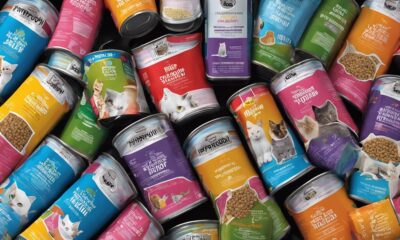
 Vetted2 months ago
Vetted2 months ago15 Best Cat Foods for Managing Hyperthyroidism – Vet Approved and Feline Friendly
-
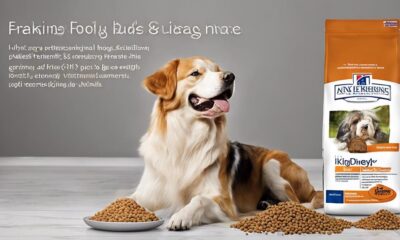
 Vetted2 months ago
Vetted2 months ago15 Best Dog Foods for Kidney Disease – Expert Recommendations for Your Pet's Health
-
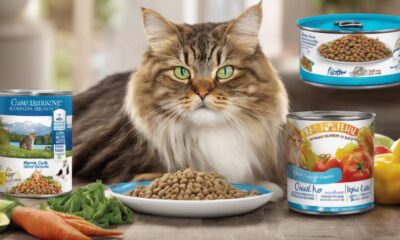
 Vetted2 months ago
Vetted2 months ago15 Best Wet Cat Foods for Older Cats to Keep Them Healthy and Happy
-

 Vetted2 months ago
Vetted2 months ago15 Best Fresh Dog Food Delivery Services for Your Pup's Health and Happiness
-
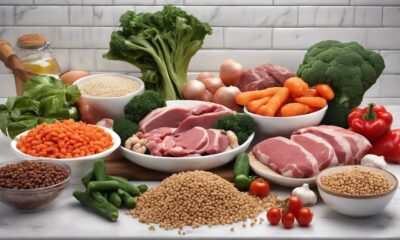
 Vetted2 months ago
Vetted2 months ago14 Best Homemade Dog Food Recipes Your Pup Will Love – Vet Approved & Nutritious
-
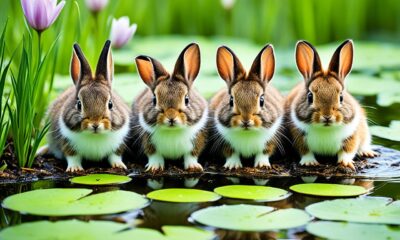
 Animal Facts2 months ago
Animal Facts2 months agoSpring Animals: A Guide to Seasonal Wildlife
-
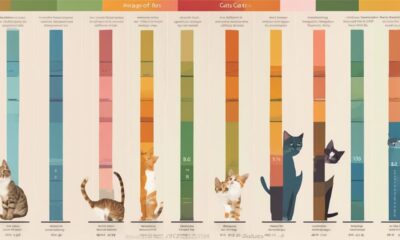
 Cats1 month ago
Cats1 month agoCat Weight Chart by Age: Kitten to Senior in Lbs
-
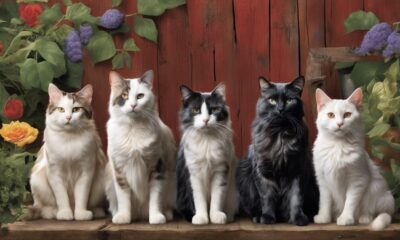
 Cats2 weeks ago
Cats2 weeks agoTop 5 Cat Breeders in Arkansas: A Guide






















